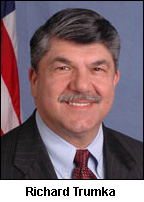OPINION
Free trade agreements hurt America’s middle class
I was honored to sit in the House gallery recently as a guest of first lady Michelle Obama to listen to President Barack Obama’s speech on putting our country back to work. The president called for rebuilding our nation’s schools, roads, bridges, transit, ports, rail, communications and energy systems. He rallied the nation and Congress to come together and take action to solve our jobs crisis.
These are the bold proposals that working people are desperate for, proposals that move us away from what got us into this mess — deregulation, undermining workers’ rights and cutting taxes for the rich — and toward the 21st century.
Yet we still have to reform some key policies that have proved not to work and even are damaging our economy: trade agreements that are structured to help multinational companies but cost U.S. jobs and hurt working people globally.
We strongly oppose the proposed trade agreements with South Korea, Colombia and Panama. They will not help put Americans back to work, only further hasten the decline of our middle class.
While many in Washington, D.C. look at trade through an elite lens, working people outside Washington have lived the reality of failed trade agreements. In fact, the damage to our economy from trade agreements is one of the few issues on which Americans across the political spectrum agree: By a nearly 4-to-1 margin, American voters say that free-trade agreements between the U.S. and other countries cost jobs instead of creating jobs.
Of course, trade agreements can create job opportunities, too, but not if they repeat the flawed policies of the past. Our country does not need more trade deals that ship jobs overseas and fail to protect workers at home and abroad. Let’s look at the three trade agreements on the table, one by one.
First, Colombia. Rewarding Colombia — the most dangerous place in the world to be a trade unionist — with a trade agreement sends the wrong message. It says we don’t mind that the government has utterly failed to protect basic labor rights and prosecute murderers of trade unionists. The number of trade unionists killed in 2010 — 51 — was an increase over 2009. Twenty-two trade unionists have been killed so far in 2011, including 15 since the much-heralded announcement of the “Labor Action Plan.”
Victims include brave men like Luis Alfonso Diaz Villa, a regional leader of the University Workers’ Union SINTRAUNICOL, who was shot and killed near his home. And Hector Orozco, father of three and vice president of the ASTRACATOL union, who was killed shortly after he reported receiving threats from an army officer.
While Colombia has taken positive steps and the Juan Manuel Santos administration has worked to change the environment for workers, Congress should not act prematurely. Once Congress votes, we will lose the leverage we have to promote workers’ rights and improve the lives of workers in Colombia.
The Korea FTA is the largest and most economically significant trade deal since NAFTA. If passed, it would cost, not create, jobs. The Economic Policy Institute estimates the growing trade imbalances associated with the Korea FTA would displace approximately 159,000 net U.S. jobs — mostly in manufacturing — continuing the hemorrhaging of manufacturing jobs that has been a key driver of our economic weakness.
Finally, Panama. The president has made a commitment to closing corporate tax loopholes yet seems to ignore Panama’s history as a haven for money launderers and tax dodgers. Rewarding countries that help the superwealthy evade taxes hurts our country, period.
The AFL-CIO and its 12 million members are committed to standing with members of Congress who want to lead on the issue of jobs and stand up for workers. We believe that trade — structured correctly — can benefit American workers. But broken-record trade agreements that skew benefits to corporate CEOs are the wrong way to do it.
If the only choice is the failed NAFTA model, we will continue to oppose trade deals. The American people will be better served by devoting our energy and resources to supporting a truly bipartisan job creator — investment in infrastructure. Infrastructure investments can create jobs, rebuild our nation and put a down payment on our children’s future. Investing in new technologies can also help us rebalance our trade deficits and make us more competitive in global markets by innovating right here at home.
I want to work together with the president and Congress to encourage trade that really works, building a new prosperity for American workers and the businesses that employ them.
Richard Trumka is President of the AFL-CIO. This column, which first appeared at Politico, is reposted at The Stand with the author’s permission.






